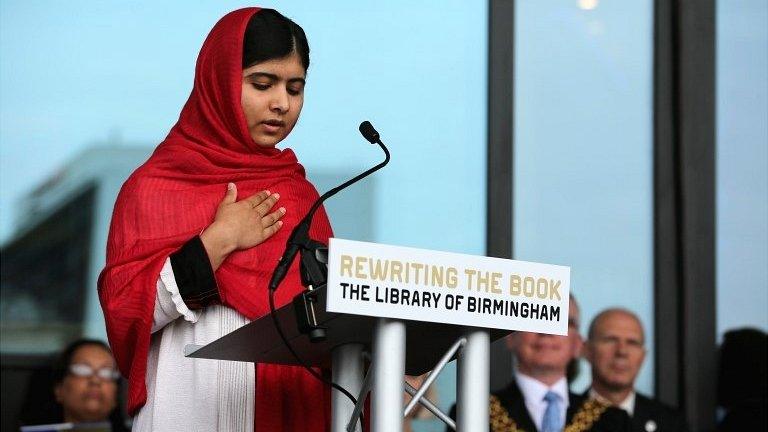More than books: How libraries are branching out to pull people in
- Published
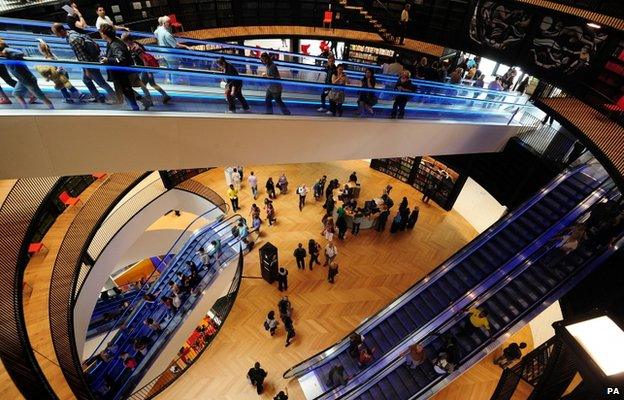
Library of Birmingham visitors can browse one million books, or practice their yoga poses
As investment in UK library services continues to fall and borrowing rates drop, many libraries are facing closure or severely restricted opening hours.
So can a broader range of events, from breastfeeding groups to bulb planting, keep people coming through the doors?
At a cost of £189m, the Library of Birmingham had to offer more than its predecessor.
It may house about one million books, but beyond the library stacks, visitors can attend an Ashtanga yoga class, a knitting group, or even try out a laughter workshop (that's learning how to "laugh for no reason").
'A very different library'
It's not the only library trying out new things.
In Worcester, The Hive library holds a weekly breastfeeding group called Baby Latte and offers "health walks" with an NHS trainer.
Baby and toddler yoga are among the events available to locals at Watton Library, near Thetford, Norfolk.
And Nantwich Library in Cheshire advertised an after-hours erotic book reading, for adults only and "not for those easily offended".
So do people go to libraries for more than just books?
"Book lending is not the Library of Birmingham's only role. It's about much more than books," says Sara Rowell, senior partnerships and marketing manager.
"This is part of the reason it is a very different library."
Inside the ten-storey building, almost every table is occupied, every computer in use.
People wander around taking pictures of its vast interior and the panoramic views from the third floor garden terrace.
Its target is to achieve up to three million visitors per year. Since it opened in September, more than 1.7 million people have passed through its doors.
Woolly planes
On a mezzanine floor above the entrance, a group has gathered for a "knitting, crochet and woolly fun" session.
"This gets me to the library more often and I do come in a few hours early sometimes to look through the books," says Anna Magpie, 23, from Erdington.
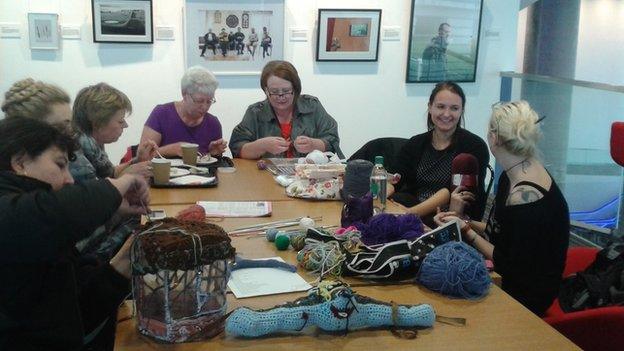
Knitting can be the gateway to discovering other library events and services, these women say
One bonus is being able to use the library bookshelves to find knitting patterns "as you need them", she says.
"It has given me more access - I'm much more able to go and pick up a Wordsworth or a Dante than if I had to go to Erdington library, which is very small and not always open.".
The group is busy making woolly versions of World War One era planes, to be hung from the library's ceiling later this year.
"Coming here for knitting makes me aware of other things going on, like galleries and exhibitions," says Laura Davies, 31, from Birmingham.
"I've never done this in a library before. It feels like more of a community thing; anyone can come in and use it, it's not just for looking at books."
'Changing lives'
Non-literary library events can serve a dual purpose, Ms Rowell says, because once people are in the door, they are more likely to engage with educational services.
"Our events programme is giving people a reason to return and hopefully introducing them to services that in some cases can change people's lives."
The library provides many learning services, including specialist advisers for literacy, numeracy and computer skills.
"People who perhaps slipped through the net at school, who may be anxious about crossing the threshold of a college, don't feel that way about a library," she adds.
In the North Yorkshire village of West Ayton, near Scarborough, a group of volunteers has a similar vision of what libraries can be, on a much smaller scale.
The former council facility became the volunteer-run Derwent Valley Bridge library and resource centre - capacity 40 people - in May 2012.
"As well as providing a library service we have guest speakers come in, for example a speaker from the local auction house, who brings items and discusses the history behind them," says Sam Merron, 28, who volunteers there for a few hours a week.
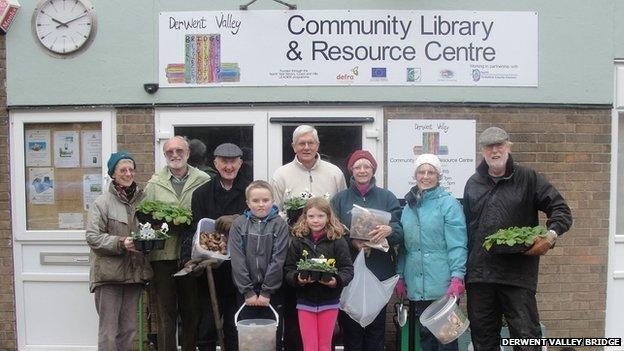
Derwent Valley Bridge centre in North Yorkshire offers dozens of activities, including bulb planting
The centre recently started a craft group, with about 25 people teaching each other knitting, crochet and sewing, Ms Merron says.
"We are definitely open to new ideas, we just want to be important in terms of the local community, we want to be a meeting place."
Back at the Library of Birmingham, in the glass-walled coffee shop Eunice Orkaa, 45, from Wolverhampton, is enjoying a drink with her four-year-old daughter Leoni.
They visit the library at least twice a week, enjoying children's plays in the library theatre.
The presence of a cafe is particularly important, she says, because it keeps people in the building longer.
"Otherwise you go and get a coffee and don't want to come all the way back to the library," she says.
Elsewhere in the 330,000 sq ft (31,000 sq m) building, parents say they are fond of the "story steps", an amphitheatre-style space with giant bean bags.
It is a place where children's storytellers sometimes reside, and toy animals are available for cuddling.
"I was telling my friends - some people think it is a normal library, but I have to tell them it's a library with a difference," Ms Orkaa says.
One big difference is feeling comfortable talking in the library's lounge areas, she says.
"It's a social space. When you go to other libraries you feel like you can't talk, here it's more relaxed."
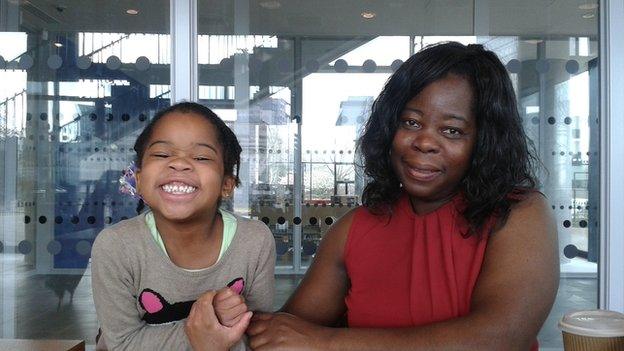
Eunice Orkaa visits the library twice a week and says she would like to attend the knitting group
- Published22 March 2014
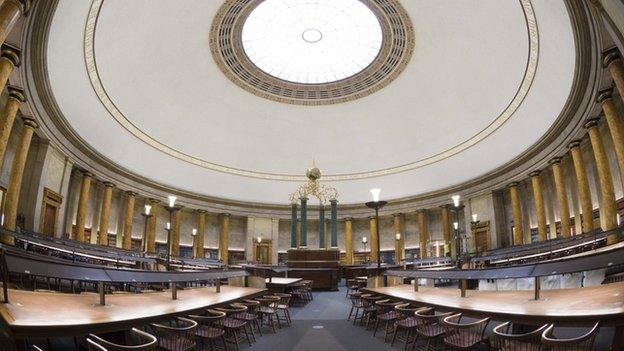
- Published27 September 2013
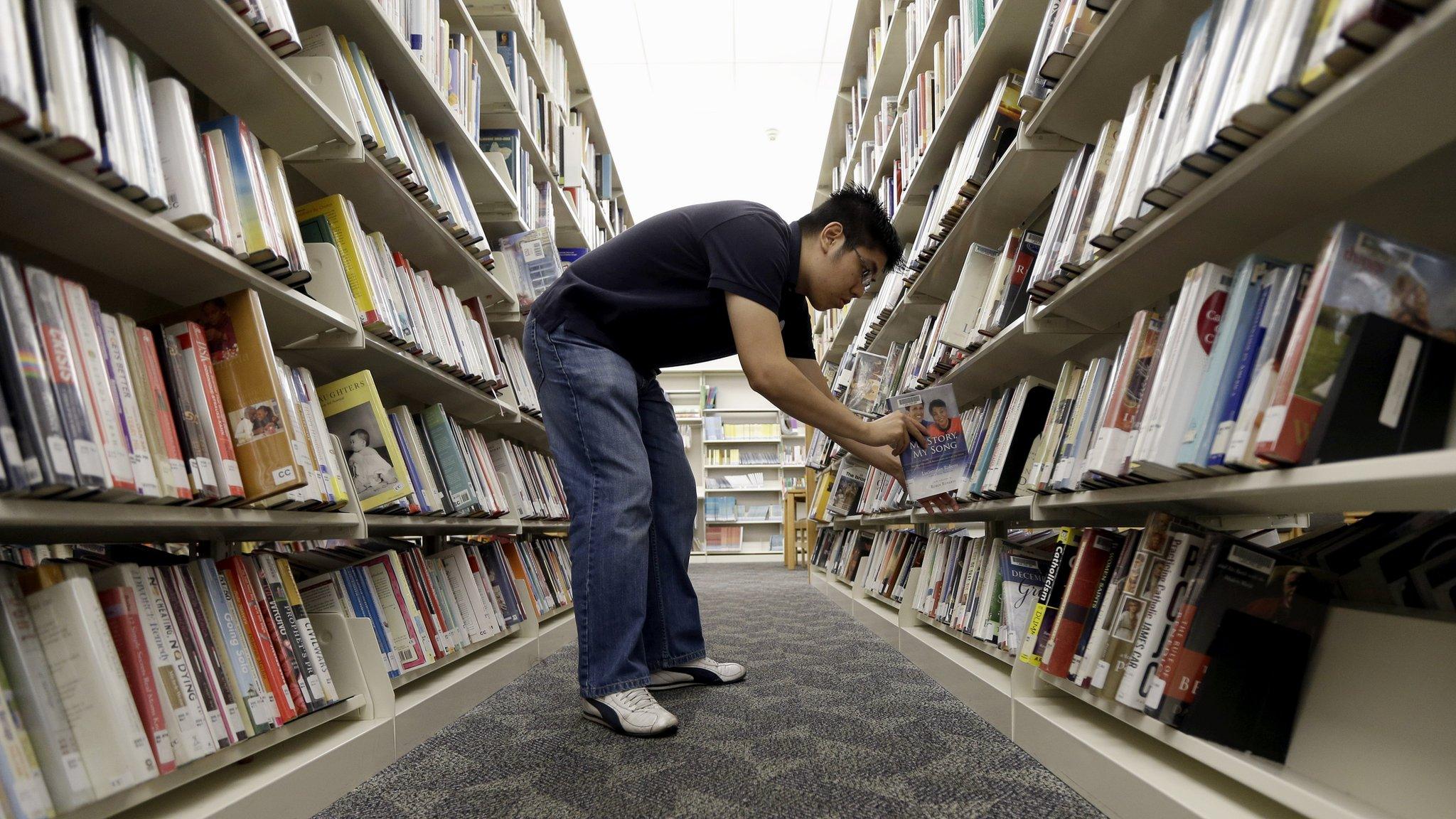
- Published3 September 2013
